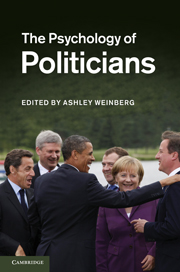3 - Politicians and power
MPs in the UK parliament
Published online by Cambridge University Press: 05 December 2011
Summary
This chapter is about power and how it is gained by Members of Parliament (MPs). It shows that, despite the rather unusual nature of the parliamentary workplace, typical organisational political behaviours and mechanisms are clearly recognisable. Politicians are not necessarily more adept at ‘doing organisational politics’ by virtue of their unquestionable familiarity with large-scale political thought and behaviour – though some seem to be. However, parliament is not an ordinary organisation, because on a day-to-day level it has the power to profoundly affect the lives of millions of people, and so behaviour within it may be disproportionately important.
The data presented here are part of a longitudinal project using an interview panel study of government Members of Parliament involving backbenchers, whips, parliamentary private secretaries (PPSs), ministers and cabinet members which has been ongoing since 1997. The findings are based on interviews undertaken between 1997 and 2003. The theoretical approach employed is best described as thematic semi-grounded, with areas of discussion remaining constant, e.g. ‘how would you currently describe the job of MP?’ The respondents were free to reply in any way, and ample opportunity was given for matters of current concern to be raised (e.g., the Gulf War, demonstrations, expenses). Findings are illustrated throughout with quotes from MPs and a variety of psychological mechanisms are indicated that may link to the thinking, feeling and enacting of political processes. Factors emerging in the House of Commons are compared to political factors present in organisations outside of Parliament.
- Type
- Chapter
- Information
- The Psychology of Politicians , pp. 39 - 58Publisher: Cambridge University PressPrint publication year: 2011
References
- 3
- Cited by



